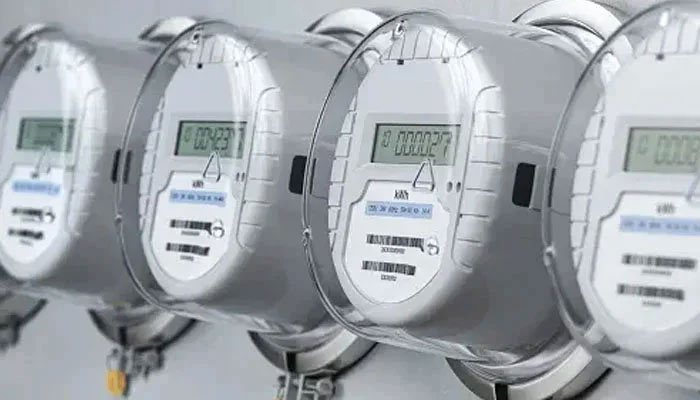Study calls for smart electric metres
Islamabad : Pakistan’s electricity sector stands at a crucial juncture as a recent study underscores the pressing need to modernise the country's electricity billing system.
This was stated in a study authored by Afia Malik, Tehmina Asad and Ghulam Mustafa here at Pakistan Institute of Development Economics (PIDE) under the Research for Social Transformation & Advancement (RASTA) programme.
It advocates for the adoption of smart meters as a solution to address financial losses, billing inaccuracies and inefficiencies in the power grid. For nearly two decades, Pakistan’s reliance on a manual billing system led to significant financial deficits, exacerbated by outdated infrastructure and rampant electricity theft. Power distribution companies (DISCOs) struggle with revenue recovery, while consumers frequently encounter billing discrepancies. A transition to Automated Metering Infrastructure (AMI) offers a transparent, data-driven approach to electricity management, ensuring efficiency and accuracy.
Dr Nadeem Javaid, Vice-Chancellor, PIDE, observed that electricity billing system’s inefficiencies are a major cause of financial losses and consumer frustration. Smart metres provide a modern solution that reduces theft, enhances billing accuracy and empowers consumers to manage electricity consumption more effectively. He said the transition is necessary for a more sustainable and efficient power sector.
A survey conducted across major cities, including Rawalpindi, Islamabad, Lahore, Multan, Faisalabad, and Sukkur revealed that 79% of respondents were willing to adopt smart metres, even if they had to bear the initial cost. The findings suggest that households using smart metres could reduce their electricity bills by up to 17% while DISCOs could significantly improve revenue collection. Case studies demonstrate the potential impact.
While the advantages of smart metres are clear, the study stresses that successful implementation requires strategic execution. A survey of 800 consumers from LESCO and MEPCO indicated that consumer awareness and engagement are critical to adoption. To ensure a smooth transition, the report recommends initiatives such as consumer education programmes to build trust, flexible payment plans that allow consumers to pay in instalments through their electricity bills and the development of a competitive smart metre market to drive down costs through increased competition.
Beyond financial efficiency, smart meters can facilitate Pakistan’s transition to a more sustainable energy system. Their integration with mobile applications and smart grids can optimise energy distribution and promote the adoption of renewable energy. However, achieving these benefits requires strong government support and policy alignment.
As countries worldwide embrace digital advancements in utility management, the study entails Pakistan not to delay in modernising its power sector.
-
 Hilary Duff’s Son Roasts Her Outfit In New Album Interview
Hilary Duff’s Son Roasts Her Outfit In New Album Interview -
 Alexandra Daddario, Andrew Form Part Ways After 3 Years Of Marriage
Alexandra Daddario, Andrew Form Part Ways After 3 Years Of Marriage -
 Eric Dane Rejected Sex Symbol Label
Eric Dane Rejected Sex Symbol Label -
 Avan Jogia Says Life With Fiancee Halsey Feels Like 'coming Home'
Avan Jogia Says Life With Fiancee Halsey Feels Like 'coming Home' -
 Kate Middleton's Role In Handling Prince William And Harry Feud Revealed
Kate Middleton's Role In Handling Prince William And Harry Feud Revealed -
 Tucker Carlson Says Passport Seized, Staff Member Questioned At Israel Airport
Tucker Carlson Says Passport Seized, Staff Member Questioned At Israel Airport -
 David, Victoria Beckham Gushes Over 'fiercely Loyal' Son Cruz On Special Day
David, Victoria Beckham Gushes Over 'fiercely Loyal' Son Cruz On Special Day -
 Taylor Swift Made Sure Jodie Turner-Smith's Little Girl Had A Special Day On 'Opalite' Music Video Set
Taylor Swift Made Sure Jodie Turner-Smith's Little Girl Had A Special Day On 'Opalite' Music Video Set -
 Eric Dane Says Touching Goodbye To Daughters Billie And Georgia In New Netflix Documentary
Eric Dane Says Touching Goodbye To Daughters Billie And Georgia In New Netflix Documentary -
 Channing Tatum Reveals What He Told Daughter After Violent Incident At School
Channing Tatum Reveals What He Told Daughter After Violent Incident At School -
 King Charles Lands In The Line Of Fire Because Of Andrew Mountbatten-Windsor
King Charles Lands In The Line Of Fire Because Of Andrew Mountbatten-Windsor -
 Denise Richards Doubles Down On Abuse Claims Against Ex Husband Aaron Phypers Amid Show Return
Denise Richards Doubles Down On Abuse Claims Against Ex Husband Aaron Phypers Amid Show Return -
 Russia Set To Block Overseas Crypto Exchanges In Sweeping Crackdown
Russia Set To Block Overseas Crypto Exchanges In Sweeping Crackdown -
 Gwyneth Paltrow Reveals Deep Personal Connection With Kate Hudson
Gwyneth Paltrow Reveals Deep Personal Connection With Kate Hudson -
 Prince Harry, Meghan Markle’s Game Plan For Beatrice, Eugenie: ‘Extra Popcorn For This Disaster’
Prince Harry, Meghan Markle’s Game Plan For Beatrice, Eugenie: ‘Extra Popcorn For This Disaster’ -
 OpenAI To Rollout AI Powered Smart Speakers By 2027
OpenAI To Rollout AI Powered Smart Speakers By 2027




